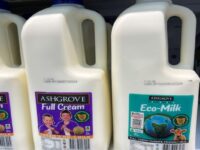 Asia Pacific’s FMCG and grocery sector has shown significant strides in health and wellness in 2018 compared to the previous year, according to Deloitte Global and The Consumer Goods Forum’s fifth annual Health & Wellness Progress report.
Asia Pacific’s FMCG and grocery sector has shown significant strides in health and wellness in 2018 compared to the previous year, according to Deloitte Global and The Consumer Goods Forum’s fifth annual Health & Wellness Progress report.
Based on a 2018 survey of 75 leading industry players, the organisations found out that over 98 per cent of the companies have reformulated some products, with over 320,000 products rehauled in 2015.
Over 70 per cent offered low-salt or low-sugar alternatives of their products while 79 per cent said between 81 – 100 per cent of their food and beverage product packaging is transparent with important nutrient information.
Some FMCG companies also partnered with education authorities on health and wellness initiatives covering over 550,000 schools around the world. Almost two million employees took part in various health and wellness initiatives, up from 1.6 million in 2017 and 1.3 million in 2016.
“FMCG and grocery retailers have an increasingly important role to play in supporting healthier lives of people, and addressing evolving consumer needs in a meaningful way. This research provides valuable insights into how well the consumer goods industry is contributing to
the health and wellness of their consumers, employees, and the communities in which they operate,” according to Vanessa Matthijssen, Deloitte Australia National Consumer Products leader.
In 2011, The Consumer Goods Forum created three resolutions and there has been steady progress since then. Consumers can now access more products and services, with 99 per cent of companies surveyed offering healthier products.
Companies have become more transparent with product information. Deloitte found out 100% of companies surveyed said they had activated programs to provide transparent, factual information, while 76% reported they had altered marketing practices to implement responsible marketing.
“Our increasingly informed consumers are making healthier lifestyle choices and are expecting manufacturers and retailers to respond accordingly. This also extends to transparency and trust around product offerings, as well as sustainability of operations and supply chains,” Matthijssen said.
















